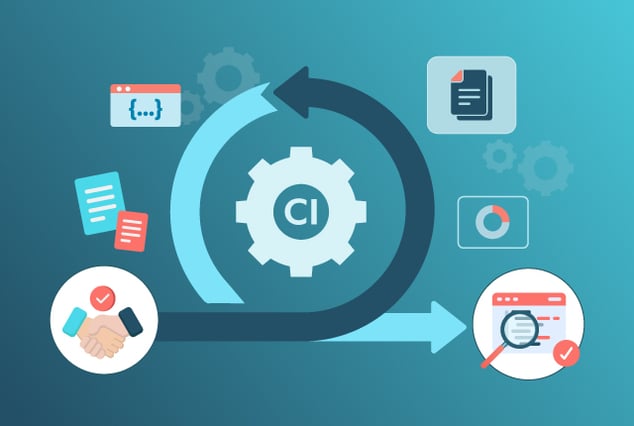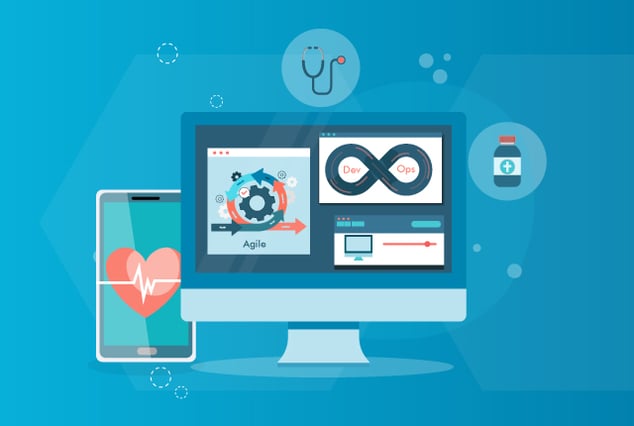
Your customers are the true market makers. They continuously contribute to reshaping your industry and influencing the competitive environment.
Your success highly depends on your time-to-market and how well you respond to your customer's demands. Employing DevOps can enable you to speed up your product delivery and improve the overall customer experience - so you can stay ahead of your competition.
An augmentation of agile software development methodology, DevOps emphasizes on development, QA, and operations that are based on collaboration, communication, and integration of different teams and processes.
Continuous integration and testing is a process of building and testing a product while fixing bugs during the incident. It mainly helps you identify defects in the initial development stages, where they are often relatively less complicated and easier to resolve.
With continuous integration, businesses ensure a higher quality product and functionality by minimizing bug risks early and eliminating delays in the delivery of the product.
Here's how continuous testing in DevOps is beneficial for your product development:
- Regular Risk Analysis: You may have a build version that undergoes all the test phases. Continuous testing highlights the potential risks at every stage.
- Improve User Experience: Continuous testing adapts to match up with your customer’s dynamic requirements. You can make constant updates based on feedback, making your product more robust, agile and reliable.
- Enhance Product Security: You can create a support system that ensures application safety from threats and malware.
- Scheduled Feedback: Evaluate all architecture layers of the delivery pipeline and also share actionable feedback with your team.
- Better Resource Utilization: Finding bugs early, as mentioned previously, saves you money and resources. You can utilize the best practices of continuous testing and defect prevention strategies and redeploy valuable resources to other strategic development initiatives.
The Role of Continuous Testing in DevOps
In a DevOps journey, continuous testing provides a continuous feedback mechanism that acts as a catalyst throughout the product delivery pipeline. Automated feedback at each stage ensures that the defects are resolved earlier in the development process.
Actionable feedback is necessary and enables you to initiate the next process in the delivery chain. For instance, if the feedback is to move forward, the process continues or alternately, if feedback highlights issues, the process is paused and corrective measures are taken.
Continuous testing performed by a team of professional QA providers helps you in assessing the business risk related to software at any point in real-time. Also, it provides risk-based feedback that helps you make better trade-off decisions.
Let's look at the four best practices for continuous testing for DevOps:
-
Effective Collaboration and Quality
Effective continuous testing requires collaboration between development, QA, and operations teams. The outdated concept that developers own the development and QA owns the testing leads to many bottlenecks, such as delayed releases and bad user experiences.
Your teams must work in harmony to achieve the desired level of quality and efficiency throughout the development and testing process. Effective collaboration in building a quality product is everyone's responsibility.
Check out this quick infographic with some ways to help increase your team's efficiency. -
Delivery Pipeline
Continuous testing consists of a wide range of tests throughout the testing process, including unit testing, integration testing, automated end-to-end and regression testing.
By continuously implementing tests at various stages throughout the delivery pipeline, you can rapidly identify and fix issues. You also improve the performance security before it delays the release of your product and costs you extra in lost time, lost revenue or loss of competitive advantage.
-
Test Automation for Reliability
Automation is necessary for successful continuous testing. It involves creating a test script, mainly in Selenium or Appium, which interacts with the functional elements without any need of human intervention.
It not only delivers better scalability and reliability compared to manual testing, but also allows manual testers to invest time in value-add activities, like exploratory testing.
-
Leverage Cloud for Scalability
Continuous testing and cloud are a perfect match. The cloud-based, cross-browser testing platform helps development teams eliminate the dilemma of maintaining the physical and virtual infrastructure, which is complicated and expensive.
Leveraging both real devices as well as cloud-based simulators and emulators ensures you a higher level of scalability that is necessary to reduce the test duration.
Rapidly evolving businesses implement DevOps testing as it breaks down the barriers between development and IT operations to shorten the development cycle.
QASource has an experienced DevOps team that can assist you with your automated testing needs, help you meet your release and quality goals faster, and strengthen your agile development processes.
Learn more about partnering with QASource to extend your resources and ensure that your team is maximizing its product development potential.
Contact us today for a free quote, or call +1.925.271.5555 to get started.


